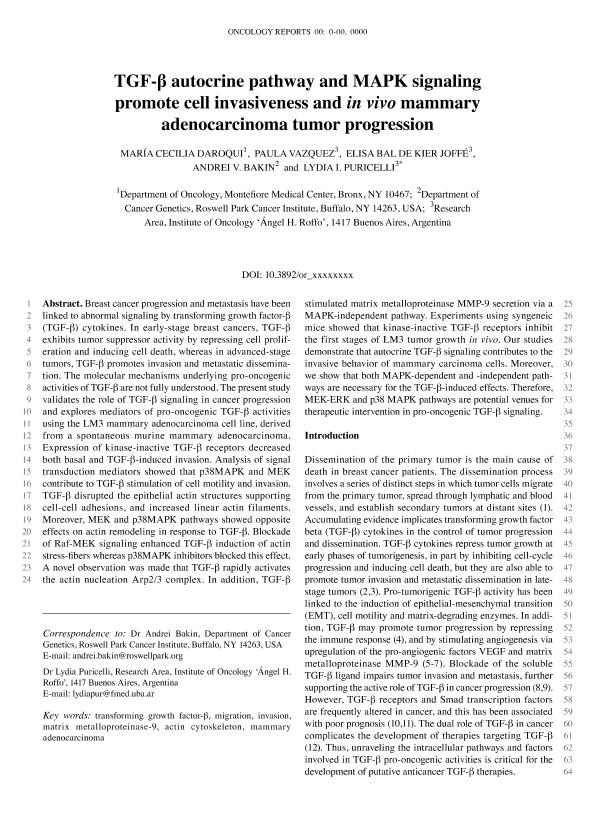Mostrar el registro sencillo del ítem
dc.contributor.author
Daroqui, María Cecilia
dc.contributor.author
Vazquez, Paula
dc.contributor.author
Bal De Kier Joffé, Elisa
dc.contributor.author
Bakin, Andrei V.
dc.contributor.author
Puricelli, Lydia Ines

dc.date.available
2023-11-13T18:46:37Z
dc.date.issued
2012-08
dc.identifier.citation
Daroqui, María Cecilia; Vazquez, Paula; Bal De Kier Joffé, Elisa; Bakin, Andrei V.; Puricelli, Lydia Ines; TGF-β autocrine pathway and MAPK signaling promote cell invasiveness and in vivo mammary adenocarcinoma tumor progression; Spandidos Publications; Oncology Reports; 28; 2; 8-2012; 567-575
dc.identifier.issn
1021-335X
dc.identifier.uri
http://hdl.handle.net/11336/217957
dc.description.abstract
Breast cancer progression and metastasis have been linked to abnormal signaling by transforming growth factor-β (TGF-β) cytokines. In early-stage breast cancers, TGF-β exhibits tumor suppressor activity by repressing cell proliferation and inducing cell death, whereas in advanced-stage tumors, TGF-β promotes invasion and metastatic dissemination. The molecular mechanisms underlying pro-oncogenic activities of TGF-β are not fully understood. The present study validates the role of TGF-β signaling in cancer progression and explores mediators of pro-oncogenic TGF-β activities using the LM3 mammary adenocarcinoma cell line, derived from a spontaneous murine mammary adenocarcinoma. Expression of kinase-inactive TGF-β receptors decreased both basal and TGF-β-induced invasion. Analysis of signal transduction mediators showed that p38MAPK and MEK contribute to TGF-β stimulation of cell motility and invasion. TGF-β disrupted the epithelial actin structures supporting cell-cell adhesions, and increased linear actin filaments. Moreover, MEK and p38MAPK pathways showed opposite effects on actin remodeling in response to TGF-β. Blockade of Raf-MEK signaling enhanced TGF-β induction of actin stress-fibers whereas p38MAPK inhibitors blocked this effect. A novel observation was made that TGF-β rapidly activates the actin nucleation Arp2/3 complex. In addition, TGF-β stimulated matrix metalloproteinase MMP-9 secretion via a MAPK-independent pathway. Experiments using syngeneic mice showed that kinase-inactive TGF-β receptors inhibit the first stages of LM3 tumor growth in vivo. Our studies demonstrate that autocrine TGF-β signaling contributes to the invasive behavior of mammary carcinoma cells. Moreover, we show that both MAPK-dependent and -independent pathways are necessary for TGF-β-induced effects. Therefore, MEK-ERK and p38 MAPK pathways are potential venues for therapeutic intervention in pro-oncogenic TGF-β signaling.
dc.format
application/pdf
dc.language.iso
eng
dc.publisher
Spandidos Publications

dc.rights
info:eu-repo/semantics/openAccess
dc.rights.uri
https://creativecommons.org/licenses/by-nc-sa/2.5/ar/
dc.subject
ACTIN CYTOSKELETON
dc.subject
INVASION
dc.subject
MAMMARY ADENOCARCINOMA
dc.subject
MATRIX METALLOPROTEINASE-9
dc.subject
MIGRATION
dc.subject
TRANSFORMING GROWTH FACTOR-Β
dc.subject.classification
Otras Ciencias de la Salud

dc.subject.classification
Ciencias de la Salud

dc.subject.classification
CIENCIAS MÉDICAS Y DE LA SALUD

dc.title
TGF-β autocrine pathway and MAPK signaling promote cell invasiveness and in vivo mammary adenocarcinoma tumor progression
dc.type
info:eu-repo/semantics/article
dc.type
info:ar-repo/semantics/artículo
dc.type
info:eu-repo/semantics/publishedVersion
dc.date.updated
2023-04-19T14:56:19Z
dc.journal.volume
28
dc.journal.number
2
dc.journal.pagination
567-575
dc.journal.pais
Grecia

dc.journal.ciudad
Atenas
dc.description.fil
Fil: Daroqui, María Cecilia. Montefiore Medical Center; Estados Unidos
dc.description.fil
Fil: Vazquez, Paula. Universidad de Buenos Aires. Facultad de Medicina. Instituto de Oncología "Ángel H. Roffo"; Argentina
dc.description.fil
Fil: Bal De Kier Joffé, Elisa. Universidad de Buenos Aires. Facultad de Medicina. Instituto de Oncología "Ángel H. Roffo"; Argentina
dc.description.fil
Fil: Bakin, Andrei V.. Roswell Park Cancer Institute; Estados Unidos
dc.description.fil
Fil: Puricelli, Lydia Ines. Universidad de Buenos Aires. Facultad de Medicina. Instituto de Oncología "Ángel H. Roffo"; Argentina. Consejo Nacional de Investigaciones Científicas y Técnicas; Argentina
dc.journal.title
Oncology Reports

dc.relation.alternativeid
info:eu-repo/semantics/altIdentifier/url/https://www.spandidos-publications.com/10.3892/or.2012.1813
dc.relation.alternativeid
info:eu-repo/semantics/altIdentifier/doi/https://doi.org/10.3892/or.2012.1813
Archivos asociados
